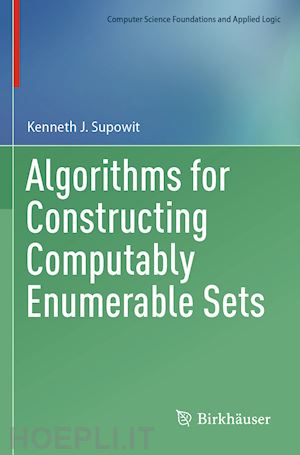
Questo prodotto usufruisce delle SPEDIZIONI GRATIS
selezionando l'opzione Corriere Veloce in fase di ordine.
Pagabile anche con Carta della cultura giovani e del merito, 18App Bonus Cultura e Carta del Docente
Logicians have developed beautiful algorithmic techniques for the construction of computably enumerable sets. This textbook presents these techniques in a unified way that should appeal to computer scientists.
Specifically, the book explains, organizes, and compares various algorithmic techniques used in computability theory (which was formerly called "classical recursion theory"). This area of study has produced some of the most beautiful and subtle algorithms ever developed for any problems. These algorithms are little-known outside of a niche within the mathematical logic community. By presenting them in a style familiar to computer scientists, the intent is to greatly broaden their influence and appeal.
Topics and features:
· All other books in this field focus on the mathematical results, rather than on the algorithms.
· There are many exercises here, most of which relate to details of the algorithms.
· The proofs involving priority trees are written here in greater detail, and with more intuition, than can be found elsewhere in the literature.
· The algorithms are presented in a pseudocode very similar to that used in textbooks (such as that by Cormen, Leiserson, Rivest, and Stein) on concrete algorithms.
· In addition to their aesthetic value, the algorithmic ideas developed for these abstract problems might find applications in more practical areas.
Graduate students in computer science or in mathematical logic constitute the primary audience. Furthermore, when the author taught a one-semester graduate course based on this material, a number of advanced undergraduates, majoring in computer science or mathematics or both, took the course and flourished in it.
Kenneth J. Supowit is an Associate Professor Emeritus, Department of Computer Science & Engineering, Ohio State University, Columbus, Ohio, US.











Il sito utilizza cookie ed altri strumenti di tracciamento che raccolgono informazioni dal dispositivo dell’utente. Oltre ai cookie tecnici ed analitici aggregati, strettamente necessari per il funzionamento di questo sito web, previo consenso dell’utente possono essere installati cookie di profilazione e marketing e cookie dei social media. Cliccando su “Accetto tutti i cookie” saranno attivate tutte le categorie di cookie. Per accettare solo deterninate categorie di cookie, cliccare invece su “Impostazioni cookie”. Chiudendo il banner o continuando a navigare saranno installati solo cookie tecnici. Per maggiori dettagli, consultare la Cookie Policy.